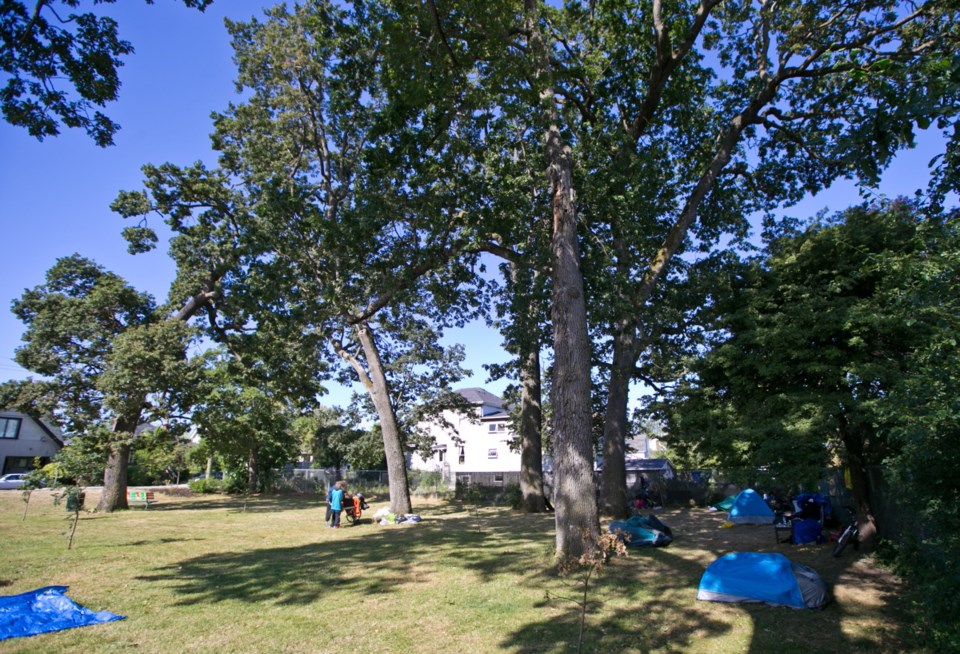Victoria city councillors will look at options ranging from micro-housing to designated camping areas to provide alternatives to homeless people sleeping in parks.
Councillors will also consider quadrupling council’s 2015 contribution to affordable housing to $1 million from the current $250,000, and directed staff to make reporting back on short-term shelter options a priority.
Coun. Ben Isitt, who proposed increasing the housing funding, said the money could come from the 2014 surplus and be earmarked in the housing reserve for the creation of interim and permanent housing with supports. It will be discussed April 9.
Councillors reaffirmed the city’s housing-first strategy in dealing with homelessness and will step up efforts to lobby senior governments for increased funding for social-housing and addictions services.
While councillors agreed homelessness is a complex issue with no quick fix, Mayor Lisa Helps said council will have to find “creative short-term solutions” to deal with the impact on city parks.
“I think everybody in this city — residents, business owners, people sleeping in parks — expects us to take some action this year,” Helps said after councillors debated the issue for three hours on Thursday.
“We can’t just say we’re doing a report and we’ll get back to you in 2016. It’s not going to work. It’s not acceptable and it’s not, I don’t think, the desire of the [council].”
City officials estimate several hundred people routinely overnight in city parks and green spaces every year, leading to noise and nuisance complaints as well as destruction of ecosystems and the accumulation of mounds of trash that have to be hauled away.
Officials peg the cost at more than $600,000, including police, bylaw and parks staff time.
The number of campers in city parks has been on the rise since 2009, when the B.C. Court of Appeal ruled that in the absence of available shelter beds, it is unconstitutional to prohibit someone from erecting temporary shelter in a park.
In response, the city amended its parks bylaw to allow people to erect tents in parks between 7 p.m. (8 p.m. during daylight time) and 7 a.m.
Bylaw officers and police routinely conduct patrols to wake people and move them on in the mornings.
Coun. Geoff Young suggested the limits of the court ruling might be tested more closely and wondered if some people were sleeping in parks simply because they didn’t want to sleep in shelters. He also asked whether there could be more enforcement targeting travellers who camp in parks.
“I think we should be saying, sometimes, to people in our parks on nights, perhaps beautiful summer nights when there is shelter available, ‘Sorry, you have to move. Shelter is available,’ ” Young said.
But Insp. Scott McGregor, who heads Victoria police’s Focused Enforcement Team, told councillors that shelter beds are consistently oversubscribed.
“For the last couple of years and last summer, I stayed really closely on top of this, being in contact with the various housing and shelter providers in the city, and they consistently were operating at 118 per cent,” he said.
“That was true, I think, from May straight through until October. Then in October, with the increase in available mats and beds, they are operating at about 112 per cent.”
Coun. Jeremy Loveday said the city might consider using outreach workers trained in customer service to rouse tenters in the mornings, rather than higher-salaried police.
“I think that somebody waking them up, maybe with a smile and a cup of coffee, who knows where the services are that are available … might be a more humane way than having a police officer come and wake them up in the morning,” Loveday said.
McGregor agreed that it probably didn’t have to be police doing the wakeups, but currently “there’s no one else to do this.”
A staff report said the vast majority of people sheltering in parks are homeless and many have mental-health and substance-abuse issues.



